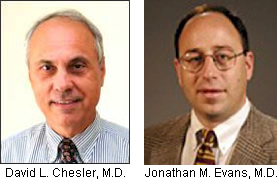 As Virginia’s population ages, so does it’s need for geriatric care. Yet doctors trained in geriatric care are increasingly hard to find. On June 11th, 2008, the Senior Statesmen of Virginia invited Drs. David L. Chesler, M.D. and Jonathan M. Evans, M.D. to speak on the challenges of geriatric care both from a medical and financial point of view.
As Virginia’s population ages, so does it’s need for geriatric care. Yet doctors trained in geriatric care are increasingly hard to find. On June 11th, 2008, the Senior Statesmen of Virginia invited Drs. David L. Chesler, M.D. and Jonathan M. Evans, M.D. to speak on the challenges of geriatric care both from a medical and financial point of view.
David L. Chesler, M.D., has been practicing Primary Care in Geriatrics in the Central Virginia area since 1977. He began his practice in the National Health Service Corps serving in Louisa County which is considered an under-served medical community. In 1980 he went into full-time practice in the Charlottesville area as a member of the Martha Jefferson Hospital. For 28 years he has maintained an outpatient geriatric clinic in Louisa County but his primary focus is within the Charlottesville area.
Dr. Chesler is part of Charlottesville Family Medicine, a primary care group of four internists and four nurse practitioners. The practice focuses on Primary Care and preventive health maintenance. Staff are certified in dietary as well as diabetic counseling. The internists maintain a full hospital practice caring for not only their own patients at Martha Jefferson Hospital but for those of other physicians in the Madison and Louisa County areas.
As a general philosophy, the practice stresses the importance of continuity of care. When possible, patients are followed wherever they go through the various changes of life and when no longer able to live independently.
Dr. Chesler is Boarded in Internal Medicine and has had additional qualification status in Geriatric Medicine since 1988. He sees patients at all the local nursing homes and has been medical director at The Cedars nursing home since 1983. He was educated at Dennison University and Case Western Reserve University in Cleveland, Ohio. He did three years of Internal Medicine residency at the University of Vermont before coming to Virginia. He holds an appointment as assistant clinical professor of Internal Medicine in the instructional faculty at the University of Virginia and teaches third-year medical students in an outpatient setting. He has been selected to “Best Doctors in America” for both Internal Medicine and Geriatrics.
He enjoys fly-fishing, bowling, dancing with a focus on Argentine Tango, tennis and gardening, He is married and has three daughters and four grandchildren some of which are boys.
Jonathan M. Evans, M.D., is associate professor of medicine at the UVa School of Medicine and chief of the section of Geriatric Medicine at University of Virginia. A strong advocate for improved long-term care in the community, he is a nationally recognized expert on geriatrics and palliative care.
He graduated from Mayo Medical School in 1989, and completed a residency in Internal Medicine and a fellowship in Geriatrics Medicine at Mayo Clinic, subsequently becoming a staff physician and Associate Professor of Medicine at Mayo Medical School. He remained at Mayo until 2000, when he received a Bush Foundation Award to pursue additional training in Public Health and Epidemiology at the University of Minnesota. He returned to Virginia in September 2001.
Dr. Evans has a clinical interest in long-term medicine and hospice care. For the past 10 years he has served as a hospice medical director, and was the founding medical director of Seasons Hospice in Rochester, Minnesota, the first free-standing Medicare-certified residential and inpatient hospice in the state of Minnesota. He has been a long-term care facility medical director since 1995 and was secretary of the American Medical Director’s Association (AMDA). He currently serves as chair of the AMDA Ethics Committee. He is medical director of Trinity Mission Health and Rehabilitation Center in Charlottesville as well as medical director of Hospice of the Piedmont.
Jonathan’s professional goals revolve around developing and improving systems of care for older persons, and in maintaining the dignity and nobility of spirit of those who reside in long-term care facilities as well as those who care for them. His research interests focus on the concept of “age-appropriate care,” preventing disability and iatrogenesis (an illness or problem caused by a doctor’s treatment) among older patients, and improving clinical outcomes of care. He has published numerous articles relating to a variety of medical conditions in the elderly and authored papers on a variety of subjects covering a broad spectrum of clinical conditions as well as ethical issues in the care of the aged.
